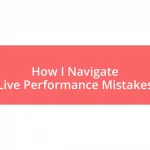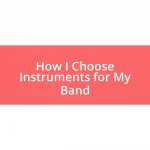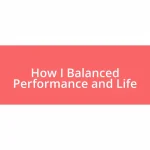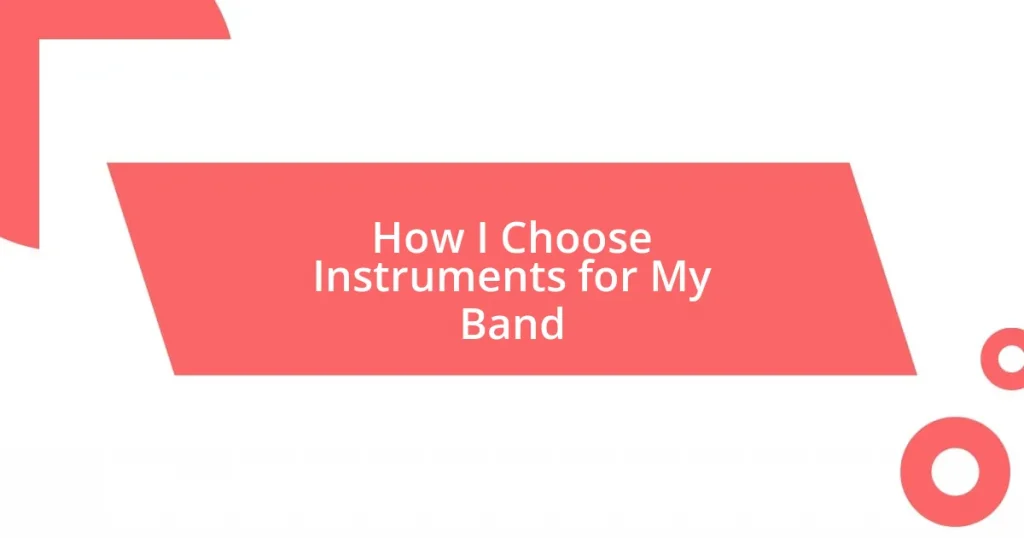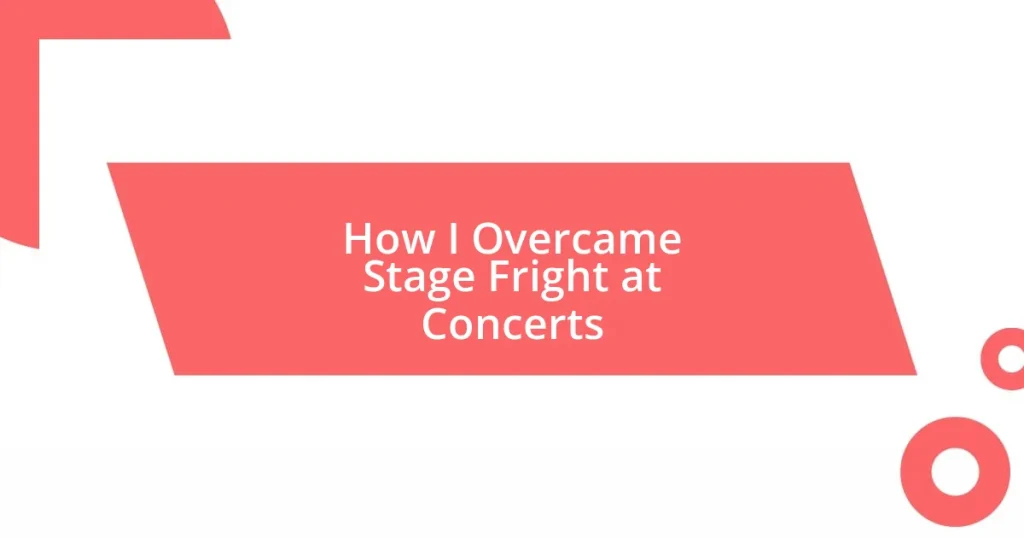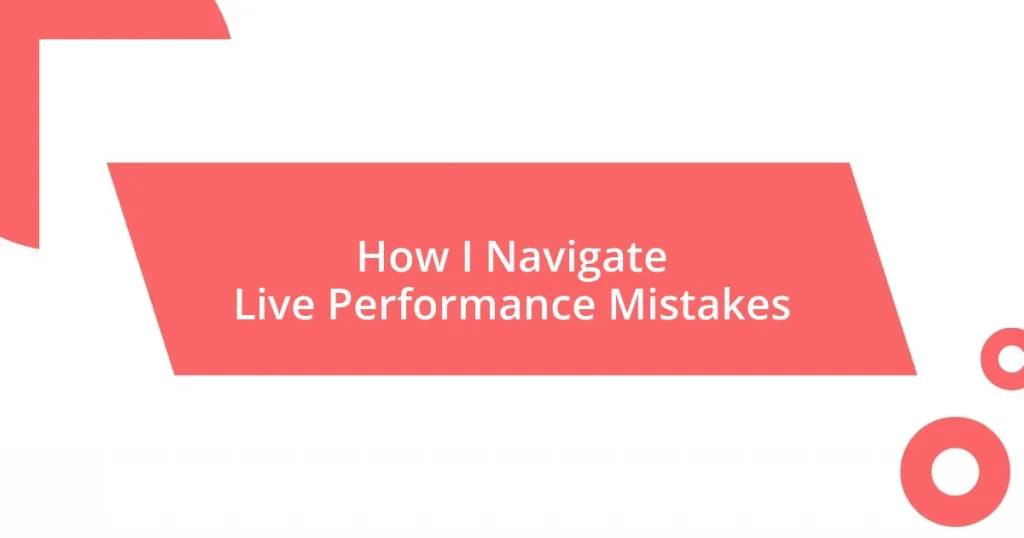Key takeaways:
- Understanding each band member’s instrumental preferences is crucial for achieving cohesive sound and emotional resonance.
- Testing instruments before purchase helps gauge compatibility with personal playing style and band dynamics.
- Expert opinions from experienced musicians can provide valuable insights that enhance instrument selection.
- Finalizing choices involves balancing emotional connection with practical considerations like budget and sound integration.
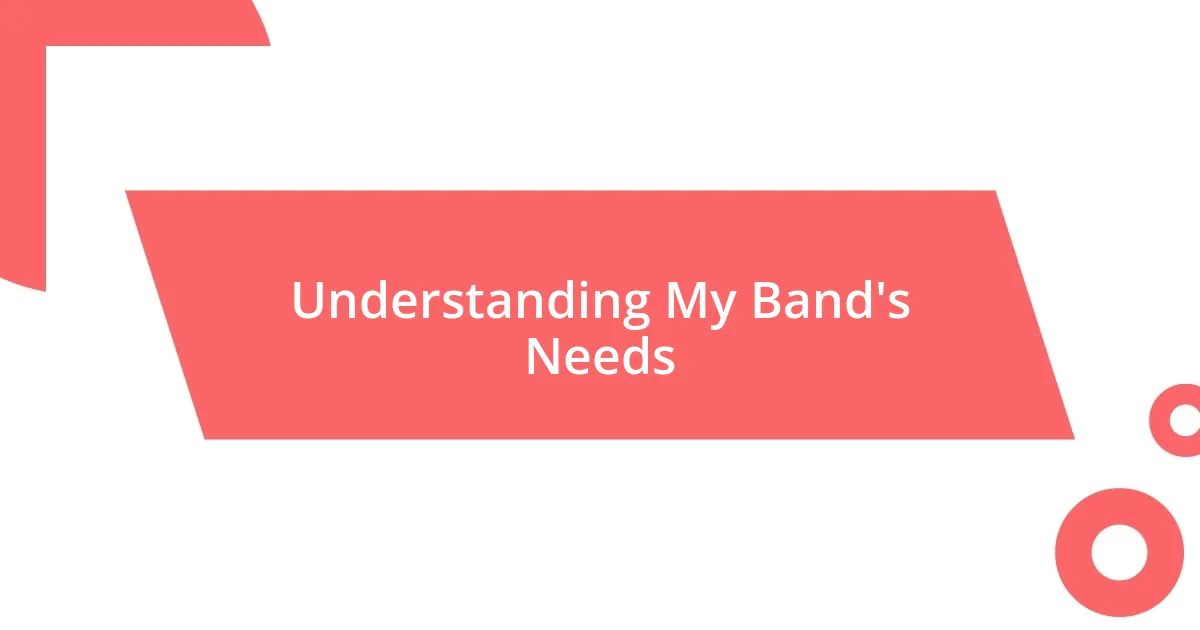
Understanding My Band’s Needs
When I first formed my band, I spent time figuring out what we truly needed to sound our best. I remember one rehearsal where we struggled with a lack of cohesion, and it hit me – our instrument choices weren’t aligning with our musical vision. Have you ever been in a situation where the pieces just don’t fit? That’s what pushed me to reevaluate our needs.
Understanding what each member brought to the table was crucial. I found that while some musicians preferred rich harmonies, others thrived on rhythmic precision. It was an eye-opener to see how variations in instruments, like switching from a keyboard to a guitar, could either enhance or disrupt our sound. Have you noticed how the right instrument can elevate a song’s emotional impact?
I also learned that a deep connection to our music is essential. One day, while experimenting with a new bass guitar, I felt a surge of energy – it just clicked. It made me realize that choosing the right instruments isn’t just about sound; it’s about resonance on a personal level, too. What’s your experience with finding that perfect match for your band?
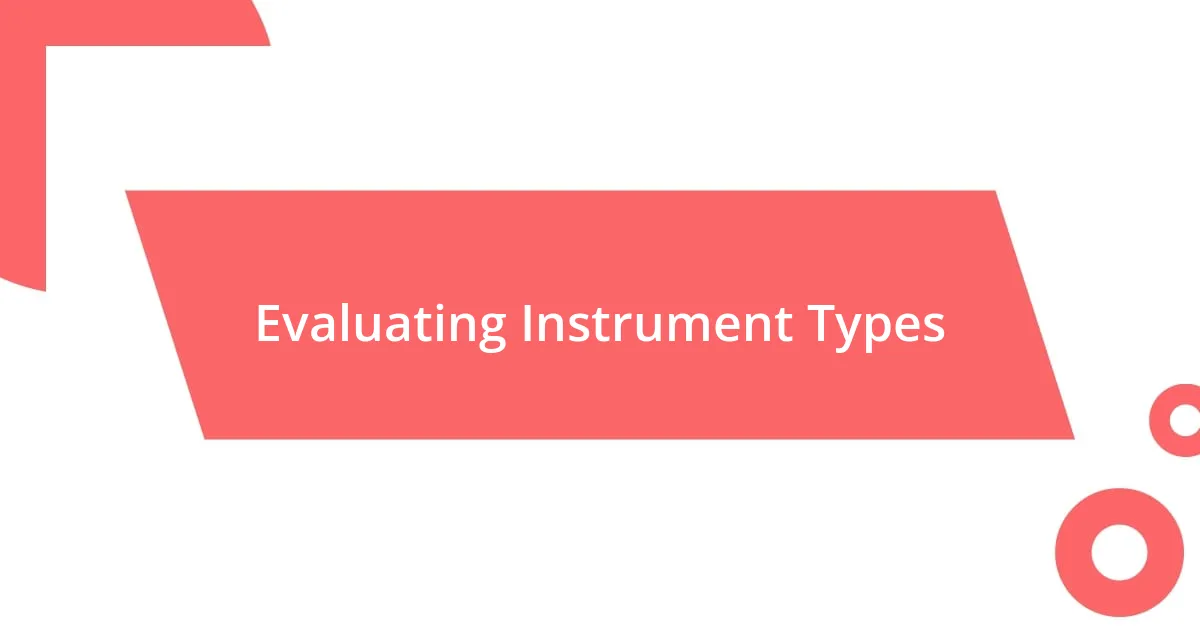
Evaluating Instrument Types
Evaluating different types of instruments is like navigating through a jungle of sound choices. Each instrument carries its own personality and emotional weight. For example, I once swapped a clarinet for a saxophone in a jazz piece, and it transformed the entire vibe. The warmth of the sax brought a new depth to our performance that was simply missing before. Have you ever changed an instrument and immediately felt the shift in energy?
When considering instrument types, it’s also crucial to factor in their compatibility with the band’s style. I remember a time when we brought in a synth; at first, it felt out of place. However, once we adjusted our arrangements, it allowed us to explore a new electronic layer that really complemented our sound. Isn’t it fascinating how flexibility in instrument choice can open doors to fresh musical avenues?
Lastly, don’t underestimate the power of instrument playability and accessibility. I recall choosing a lightweight guitar for our lead player because it increased their performance comfort. This small decision had a huge impact on their confidence and stage presence. Have you noticed how the comfort level of an instrument can directly influence a performance’s energy?
| Instrument Type | Characteristics |
|---|---|
| Electric Guitar | Versatile, often used in various genres, can create a wide range of sounds |
| Keyboard Synth | Adds layers and depth but may require additional arrangements for integration |
| Acoustic Drums | Traditionally loud and expressive, crucial for live performances, but can be bulky |
| Bass Guitar | Foundation of rhythm, provides power, and drives the music forward |
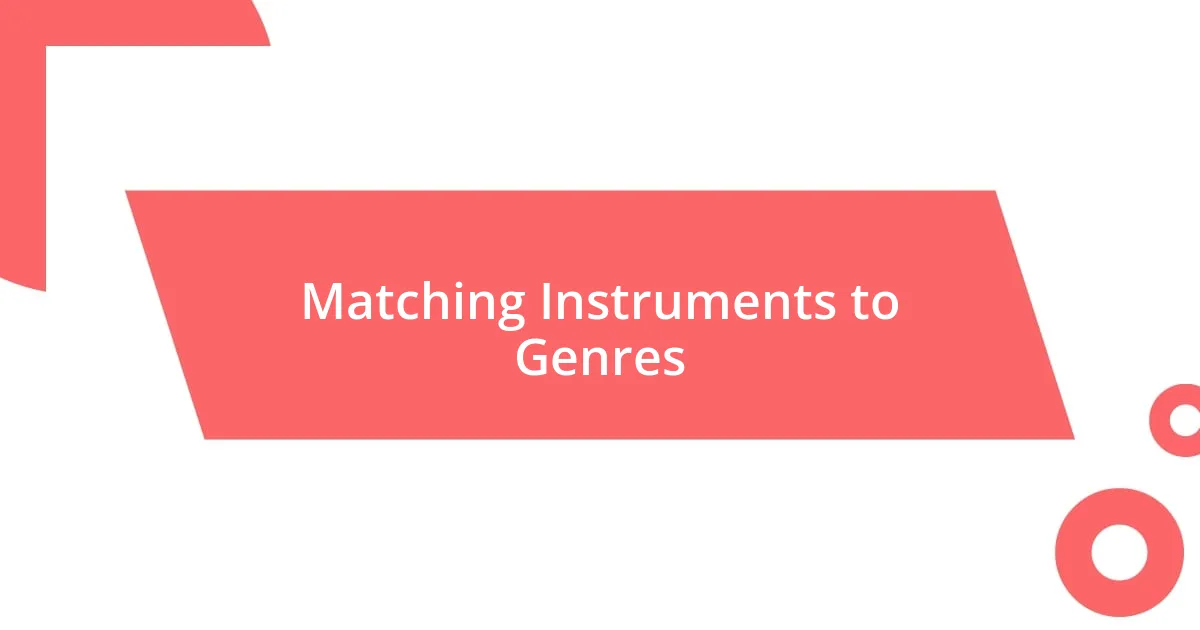
Matching Instruments to Genres
Matching instruments to genres is essential for creating a sound that resonates with both the band and the audience. I remember a gig where we played a folky ballad, and the moment we introduced a banjo, the whole room shifted. It wasn’t just a change in sound; the energy transformed, bringing an authenticity that instantly connected us with the crowd. Have you felt that moment when the right instrument elevates a performance to a new level?
When choosing instruments, I often consider these key aspects:
- Genre Compatibility: Certain instruments are synonymous with specific genres, like the banjo in bluegrass or the electric guitar in rock.
- Mood and Emotion: Instruments evoke different feelings; for instance, a mellow flute can create a sense of calm in a soft jazz piece.
- Audience Expectation: Understanding what the audience associates with a genre can guide instrument choices, such as using brass in a swing band to maintain that lively feel.
- Experimentation: Sometimes, stepping outside genre norms can lead to exciting discoveries. For example, pairing a cello with indie rock for unexpected depth and richness.
In my experience, the exploration process can be as thrilling as the performance itself, each choice leading us further along our musical journey. This is where I find joy—discovering not just how instruments sound, but how they shape the very essence of our genre. Have you ever taken a leap and found an incredible fit where you least expected?
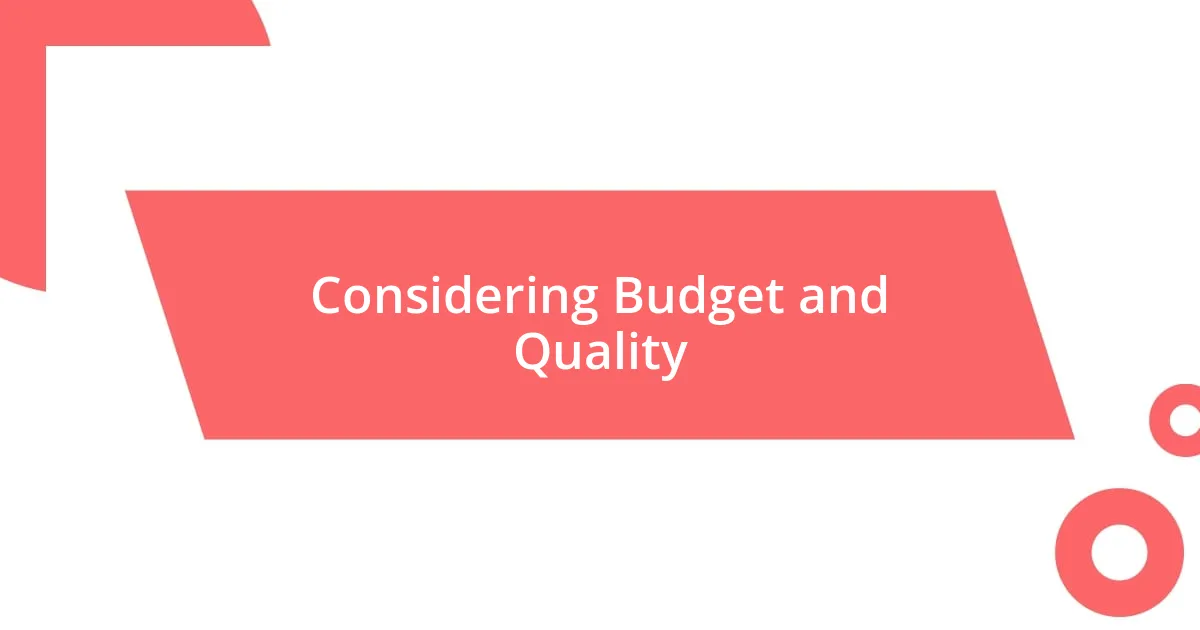
Considering Budget and Quality
When it comes to instruments, budget constraints can be a real game-changer. I vividly remember a time when my band was eyeing high-end guitars, only to realize how much they drained our funds. So, we pivoted to finding mid-range options that offered great quality without breaking the bank. It’s amazing how resourcefulness often leads to discovering hidden gems.
Quality is crucial, but it doesn’t always have to mean spending a fortune. For instance, I once found a beautiful, vintage bass at a local pawn shop that sounded incredible and was surprisingly affordable. That instrument not only enhanced our sound but also reminded me that the right piece can come from the most unexpected places. Have you ever stumbled upon an instrument that you initially overlooked but ended up being a perfect match?
Balancing budget and quality often requires some tough decisions. There have been moments when we had to sacrifice certain features for overall sound quality, but I’ve learned that sometimes it’s worth it to invest in a reliable instrument that withstands the test of time. It’s this balance that shapes our musical identity. How do you navigate that tricky landscape of choosing the best instruments for your budget?
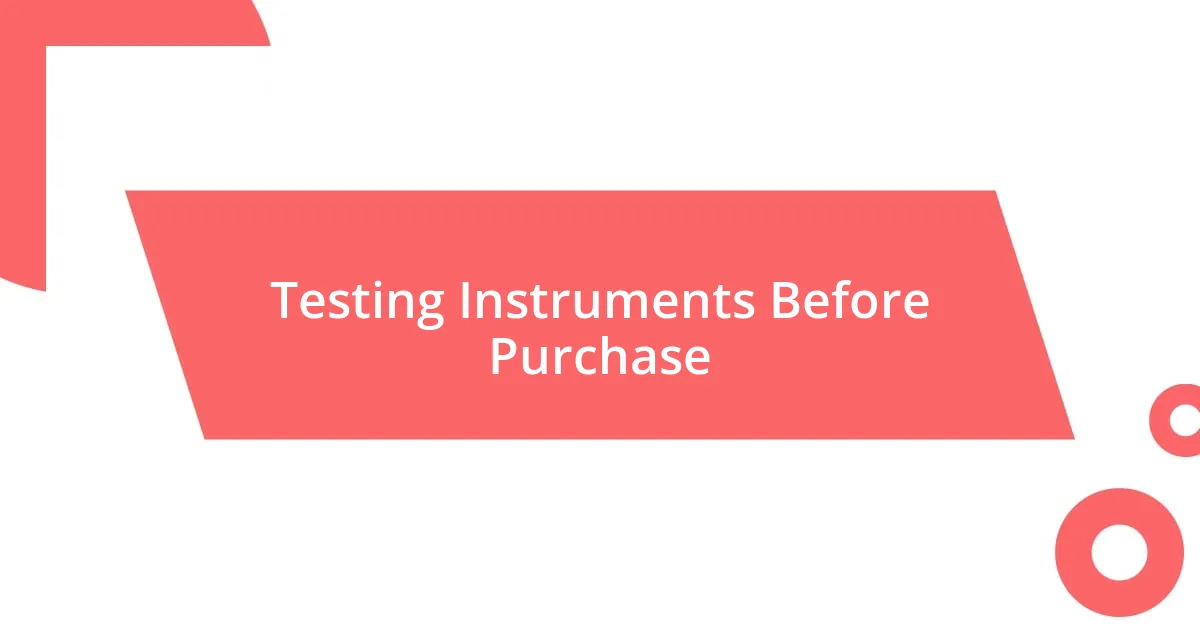
Testing Instruments Before Purchase
Testing instruments before making a purchase is a crucial step for any musician. I recall walking into a music store, the air buzzing with a symphony of sounds, and feeling the excitement as I tried out various guitars. Each strum helped me gauge not just the sound, but how each instrument resonated with my playing style. Have you ever felt that connection with a piece of equipment the moment you picked it up?
I also believe in the power of diversity during testing. There was this one time I tested a myriad of keyboards, each offering a different soundscape. Some felt intuitive and comfortable, while others felt out of sync with my musical voice. It’s like pairing the right shoes with the right outfit—some just fit perfectly. In your experience, has an unexpected instrument surprised you during testing?
Moreover, I find it beneficial to play along with a few tracks while testing. Once, I brought my favorite songs to a store and realized how each instrument complemented the music. That moment of clarity reinforced my decision to choose an acoustic guitar that brightened the mood of my band’s sound. It’s astonishing how testing can reveal not only the tone but also how an instrument can transform a piece. Have you ever played a familiar tune and felt that immediate spark with a new instrument?

Seeking Expert Opinions
Seeking expert opinions on instruments can truly enhance our decision-making process. I remember attending a local jam session where seasoned musicians shared their insights on gear. Listening to their experiences, I realized that sometimes the best advice comes from those who’ve spent countless hours playing and working with various instruments. Have you ever sought guidance from someone who has been in your shoes before? It can be eye-opening.
Every time I attend gear expos, I find myself fascinated by the wealth of knowledge available. At one of these events, I met a luthier who spoke passionately about the craftsmanship behind handmade guitars. His enthusiasm was infectious, and it helped me appreciate the nuances in sound that I had previously overlooked. This personal connection not only informed my choices but also fostered a deeper understanding of what makes an instrument unique. Have you discovered an unexpected passion for a particular brand or builder through these conversations?
Diving into expert opinions doesn’t stop at music stores or expos. Engaging in online communities has also been a game-changer for me. I vividly recall a forum discussion where a fellow musician recommended a specific model after sharing his journey with it. His candid insights helped me avoid a potentially costly mistake and directed me to an instrument that perfectly matched my band’s style. When was the last time you found valuable advice online that changed your perspective on an instrument? Connecting with others can lead us to the right choices more effortlessly.
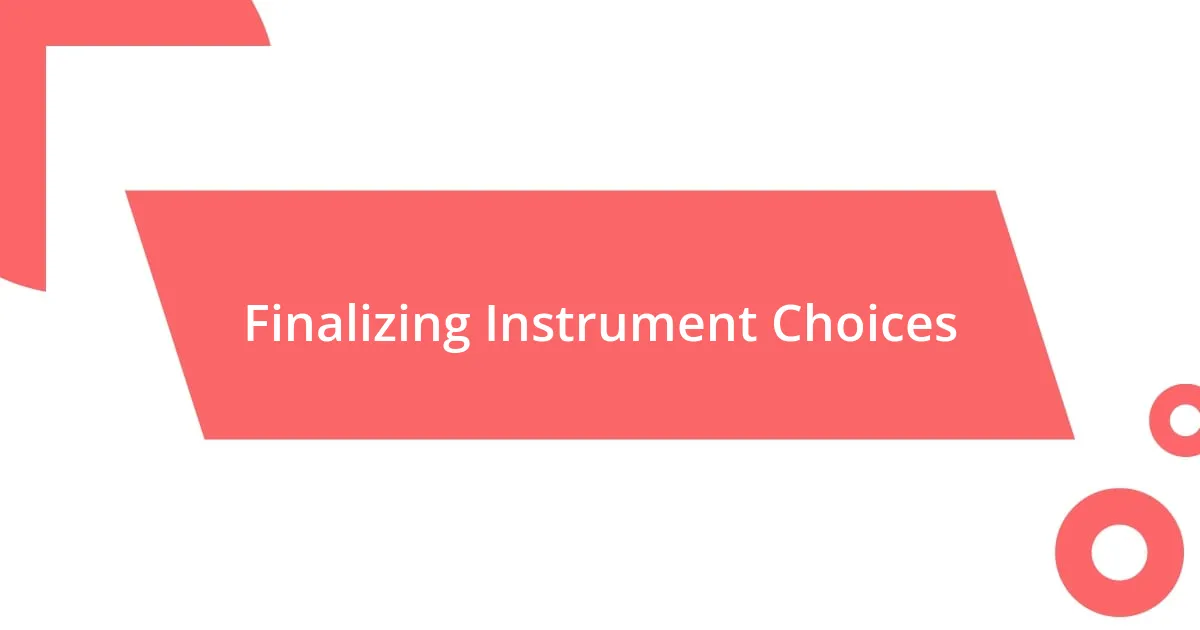
Finalizing Instrument Choices
When it comes to finalizing instrument choices, my approach often involves reflecting on how each piece ties into my band’s overall sound. I recall a moment after testing several basses; I was torn between two models that felt equally compelling. Ultimately, I began to visualize how each instrument would fit within our music’s layers, and that image helped me make the choice easier. Have you ever envisioned a specific sound and knew the right instrument would bring it to life?
Another effective method for me is revisiting my initial instincts. Back in the early days of forming my band, I was drawn to a vintage saxophone. Despite its imperfections, there was a raw energy that inspired me as soon as I held it. After considering all the technical specs and expert opinions, I realized the emotional connection mattered most. As you finalize your choices, do you ever find yourself drawn to something that simply feels right, even if it doesn’t tick every box on your checklist?
Lastly, I believe it’s essential to consider practicality alongside passion. As I sat down to calculate budgets and logistics, I often felt nervous, knowing some choices were making my wallet lighter. However, it was crucial to prioritize instruments that not only resonated with my artistic vision but also suited our performance needs. This balancing act can feel daunting, but I trust that grounding my decisions in practicality leads to lasting satisfaction. How do you find that balance between emotional fulfillment and the reality of your budget?

